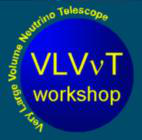Orateur
Robert LAHMANN
(University of Erlangen)
Description
The use of conventional neutrino telescope methods and technology for detecting neutrinos with ultra-high energies from astrophysical sources would be prohibitively expensive and may turn out to be technically not feasable. Acoustic detection is a promising option for future deep-sea neutrino telescopes operating in this energy regime. It utilises the effect that a cascade evolving from a neutrino interaction in water generates a coherently emitted sound wave with frequency components in the range between 1 and 50 kHz. The AMADEUS (Antares Modules for Acoustic DEtection Under the Sea) project is integrated into the ANTARES neutrino telescope and aims at the investigation of techniques for acoustic particle detection in sea water. The acoustic sensors of AMADEUS are using piezo elements and are recording a broad-band signal with frequencies ranging up to 125 kHz. After an introduction into acoustic neutrino detection it will be shown how an acoustic array similar to AMADEUS could be used for positioning as well as marine research and acoustic particle detection. Experience from AMADEUS and possibilities for a future large scale neutrino telescope in the Mediterranean Sea will be discussed.

